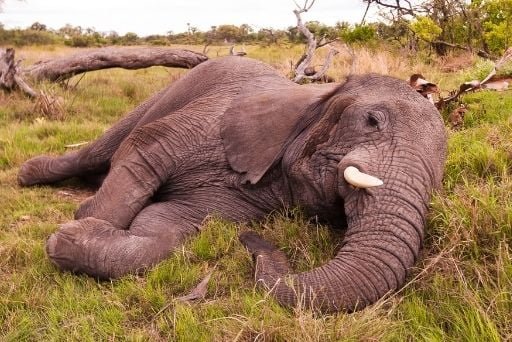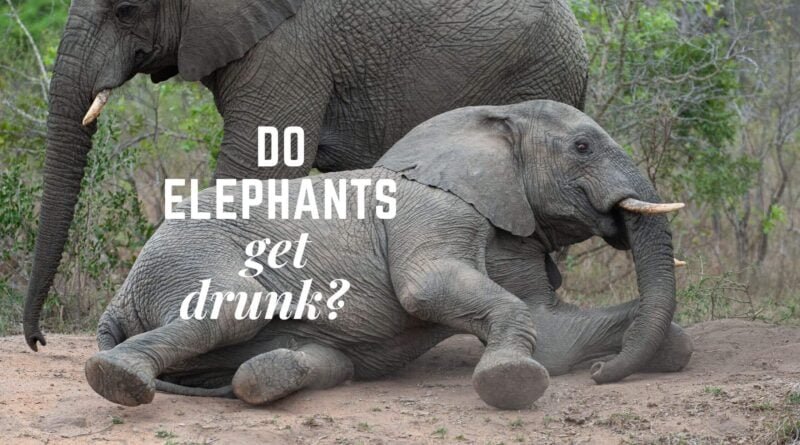Do elephants get drunk?
Stories about wild animals evidently getting drunk after eating fermenting or rotting fruits are widespread. Elephants, in particular, have been the center point of such stories. There are anecdotes about African elephants eating marula fruits that are said to have a hallucinating effect on the mind. There was a moose who ate too many rotten apples and got stuck in a tree. Vervet monkeys of St. Kitts were seen stealing drinks from tourists after their fondness for sugar and alcohol increased. In the wild, chimpanzees make tools like leaf sponges to collect the sap from raffia palms that have the properties of alcohol.
Despite these stories being told over and over again, they are often dismissed as myths. According to some scientists, it is unlikely for an elephant to enough rotten fruits to get drunk. However, new strides have been made in the field of ethanol metabolism in animals, and it shows that these stories about animals getting drunk in the wild after consuming so many rotten fruits are possibly true.
What Do Scientists Claim?
According to scientists and researchers, elephants are too big to get drunk. However, when this claim was made, they based them on a simple calculation that included the body size of an elephant, the amount of ethanol content in marula fruit, and how quickly humans can break down ethanol in their bodies. Basically, scientists justified their claim by considering how much it would take for a human to feel intoxicated after consuming alcohol and scale-up for an elephant’s size.
This logic has some fatal flaws. For starters, it deduces that elephants can break down ethanol as quickly as a human being. Further research indicates that this assumption is completely baseless.
Humans, unlike other primates, have a special ability to metabolize ethanol quickly. The primary enzyme responsible for breaking down ethanol is ADH7 (alcohol dehydrogenase class 4), which has a variation making us 40x faster at metabolizing ethanol.
This change occurred around 10 million years ago before we started fermenting fruits for alcohol and beverages. It evolved after we adapted a terrestrial lifestyle. This is probably when we encountered fallen fruit. Overripe fruits can surprisingly have high ethanol content.

Can we compare our metabolism with that of other animals?
So, if we have an extremely fast metabolism, can we compare elephants by adjusting for body size? Well, to know the capabilities of other mammals as compared to humans to break down ethanol, scientists compared the ADH7 gene across 85 mammals.
Surprisingly, it was found that the majority of mammals do not share the variation for faster metabolism; that is, faster ethanol breakdown. It was also found that many mammals don’t even have a functional ADH7 gene, including elephants – both Asian and African. An extinct relative of elephants, woolly mammoths, also didn’t have one. The study revealed that mammals that are deprived of the gene have one thing in common – they regularly don’t eat fruits. Essentially, their diets consist of grass, foliage, and meat.
Metabolizing ethanol is a complex process that requires a number of different enzymes and involves several steps. Therefore, it is possible that elephants can break down ethanol in some other way. Nevertheless, it is unlikely that their efficiency to break down ethanol can be compared to that of humans. Therefore, you just cannot scale up the body size to determine whether elephants can become intoxicated from eating rotten marula fruit.

So, can elephants get drunk?
Maybe! Since elephants do not have the ADH7 gene, it suggests that they cannot handle their plonk. But researchers point out that it is pretty much erroneous to make conclusions about elephants based on another with divergent ecologies and physiologies.
What about other mammals?
In human society, there are some mammals who share the similar or same changes to their ADH7 mutation. These mammals tend to eat a lot of nectar and fruit. Aye-Aye, a primate native to Madagascar, drinks the nectar of the traveler’s palm, which is said to be fermented. This is one example that shows that there are some mammals that consume alcohol.
One more example is the fruit bats, particularly flying foxes and cave nectar bat, whose diet includes nothing but nectar and fruits. These mammals are also better at digesting ethanol. Now, you may think that bats fly to travel from one place to another. So, it is an interesting adaptation because a drunk bat would find it difficult to navigate to places. They have adapted to this system and possibly can fly inebriated without any issue.
Because mammals live on a diverse diet, their digestive systems are also diverse. So, it is not intelligent to compare the digestive system of humans with other mammals. There are chemicals and enzymes that a human digestive system cannot digest and metabolize properly. It is all about evolution.





